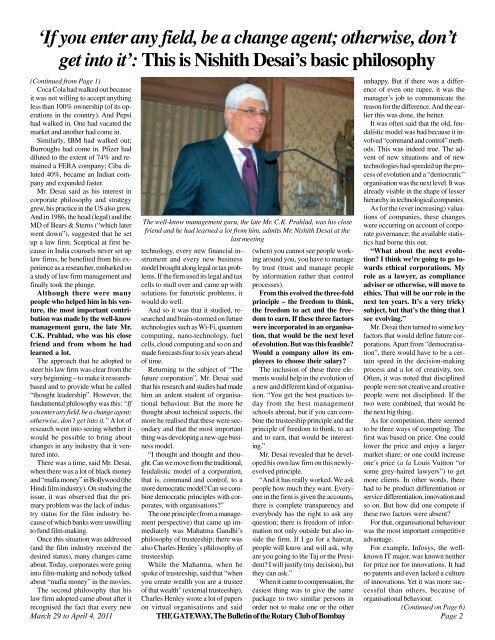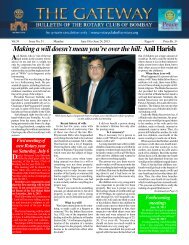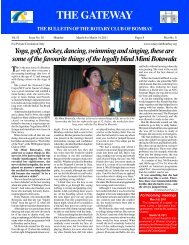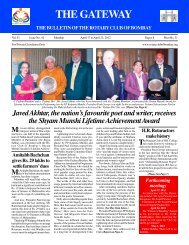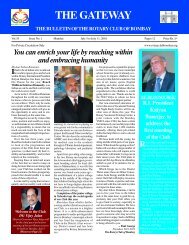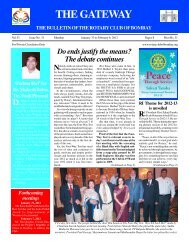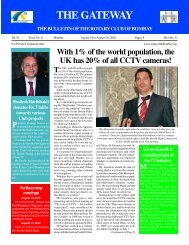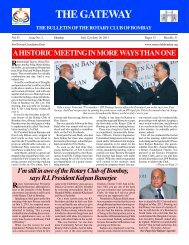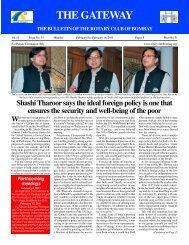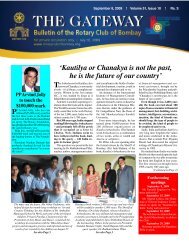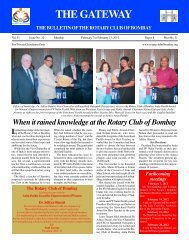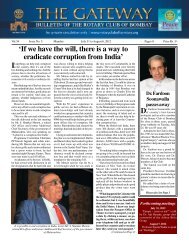You also want an ePaper? Increase the reach of your titles
YUMPU automatically turns print PDFs into web optimized ePapers that Google loves.
‘If you enter any field, be a change agent; otherwise, don’tget into it’: This is Nishith Desai’s basic philosophy(Continued from Page 1)Coca Cola had walked out becauseit was not willing to accept anythingless than 100% ownership (<strong>of</strong> its operationsin the country). And Pepsihad walked in. One had vacated themarket and another had come in.Similarly, IBM had walked out;Burroughs had come in. Pfizer haddiluted to the extent <strong>of</strong> 74% and remaineda FERA company; Ciba diluted40%, became an Indian companyand expanded faster.Mr. Desai said as his interest incorporate philosophy and strategygrew, his practice in the US also grew.unhappy. But if there was a difference<strong>of</strong> even one rupee, it was themanager’s job to communicate thereason for the difference. And the earlierthis was done, the better.It was <strong>of</strong>ten said that the old, feudalisticmodel was bad because it involved“command and control” methods.This was indeed true. The advent<strong>of</strong> new situations and <strong>of</strong> newtechnologies had speeded up the process<strong>of</strong> evolution and a “democratic”organisation was the next level. It wasalready visible in the shape <strong>of</strong> lesserhierarchy in technological companies.As for the (ever increasing) valuations<strong>of</strong> companies, these changesAnd in 1986, the head (legal) and theMD <strong>of</strong> Bears & Sterns (“which laterThe well-know management guru, the late Mr. C.K. Prahlad, was his closewere occurring on account <strong>of</strong> corporategovernance; the available statis-went down”), suggested that he setfriend and he had learned a lot from him, admits Mr. Nishith Desai at theup a law firm. Sceptical at first becauselast meetingtics had borne this out.in India counsels never set uplaw firms, he benefited from his experienceas a researcher, embarked ona study <strong>of</strong> law firm management andfinally took the plunge.Although there were manypeople who helped him in his venture,the most important contributionwas made by the well-knowmanagement guru, the late Mr.C.K. Prahlad, who was his closefriend and from whom he hadlearned a lot.The approach that he adopted tosteer his law firm was clear from thevery beginning – to make it researchbasedand to provide what he called“thought leadership”. However, thefundamental philosophy was this: “Ifyou enter any field, be a change agent;otherwise, don’t get into it.” A lot <strong>of</strong>research went into seeing whether itwould be possible to bring aboutchanges in any industry that it venturedinto.There was a time, said Mr. Desai,when there was a lot <strong>of</strong> black moneyand “mafia money” in Bollywood (theHindi film industry). On studying theissue, it was observed that the primaryproblem was the lack <strong>of</strong> industrystatus for the film industry because<strong>of</strong> which banks were unwillingto fund film-making.Once this situation was addressed(and the film industry received thedesired status), many changes cameabout. Today, corporates were goinginto film-making and nobody talkedabout “mafia money” in the movies.The second philosophy that hislaw firm adopted came about after itrecognised the fact that every newtechnology, every new financial instrumentand every new businessmodel brought along legal or tax problems.If the firm used its legal and taxcells to mull over and came up withsolutions for futuristic problems, itwould do well.And so it was that it studied, researchedand brain-stormed on futuretechnologies such as Wi-Fi, quantumcomputing, nano-technology, fuelcells, cloud computing and so on andmade forecasts four to six years ahead<strong>of</strong> time.Returning to the subject <strong>of</strong> “Thefuture corporation”, Mr. Desai saidthat his research and studies had madehim an ardent student <strong>of</strong> organisationalbehaviour. But the more hethought about technical aspects, themore he realised that these were secondaryand that the most importantthing was developing a new-age businessmodel.“I thought and thought and thought.Can we move from the traditional,feudalistic model <strong>of</strong> a corporation,that is, command and control, to amore democratic model? Can we combinedemocratic principles with corporates,with organisations?”The one principle (from a managementperspective) that came up immediatelywas Mahatma Gandhi’sphilosophy <strong>of</strong> trusteeship; there wasalso Charles Henley’s philosophy <strong>of</strong>trusteeship.While the Mahatma, when hespoke <strong>of</strong> trusteeship, said that “whenyou create wealth you are a trustee<strong>of</strong> that wealth” (external trusteeship),Charles Henley wrote a lot <strong>of</strong> paperson virtual organisations and said(when) you cannot see people workingaround you, you have to manageby trust (trust and manage peopleby information rather than controlprocesses).From this evolved the three-foldprinciple – the freedom to think,the freedom to act and the freedomto earn. If these three factorswere incorporated in an organisation,that would be the next level<strong>of</strong> evolution. But was this feasible?Would a company allow its employeesto choose their salary?The inclusion <strong>of</strong> these three elementswould help in the evolution <strong>of</strong>a new and different kind <strong>of</strong> organisation.“You get the best practices todayfrom the best managementschools abroad, but if you can combinethe trusteeship principle and theprinciple <strong>of</strong> freedom to think, to actand to earn, that would be interesting.”Mr. Desai revealed that he developedhis own law firm on this newlyevolvedprinciple.“And it has really worked. We askpeople how much they want. Everyonein the firm is given the accounts,there is complete transparency andeverybody has the right to ask anyquestion; there is freedom <strong>of</strong> informationnot only outside but also insidethe firm. If I go for a haircut,people will know and will ask, whyare you going to the Taj or the President?I will justify (my decision), butthey can ask.”When it came to compensation, theeasiest thing was to give the samepackage to two similar persons inorder not to make one or the other“What about the next evolution?I think we’re going to go towardsethical corporations. Myrole as a lawyer, as complianceadviser or otherwise, will move toethics. That will be our role in thenext ten years. It’s a very trickysubject, but that’s the thing that Isee evolving.”Mr. Desai then turned to some keyfactors that would define future corporations.Apart from “democratisation”,there would have to be a certainspeed in the decision-makingprocess and a lot <strong>of</strong> creativity, too.Often, it was noted that disciplinedpeople were not creative and creativepeople were not disciplined. If thetwo were combined, that would bethe next big thing.As for competition, there seemedto be three ways <strong>of</strong> competing. Thefirst was based on price. One couldlower the price and enjoy a largermarket share; or one could increaseone’s price (a la Louis Vuitton “orsome grey-haired lawyers”) to getmore clients. In other words, therehad to be product differentiation orservice differentiation, innovation andso on. But how did one compete ifthese two factors were absent?For that, organisational behaviourwas the most important competitiveadvantage.For example, Infosys, the wellknownIT major, was known neitherfor price nor for innovations. It hadno patents and even lacked a culture<strong>of</strong> innovations. Yet it was more successfulthan others, because <strong>of</strong>organisational behaviour.(Continued on Page 6)March 29 to April 4, 2011 THE GATEWAY, The Bulletin <strong>of</strong> the <strong>Rotary</strong> <strong>Club</strong> <strong>of</strong> <strong>Bombay</strong> Page 2


